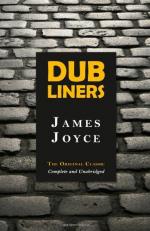Mr. H. B. Patterson Finlay, on behalf of the railway company, expressed his deep regret at the accident. The company had always taken every precaution to prevent people crossing the lines except by the bridges, both by placing notices in every station and by the use of patent spring gates at level crossings. The deceased had been in the habit of crossing the lines late at night from platform to platform and, in view of certain other circumstances of the case, he did not think the railway officials were to blame.
Captain Sinico, of Leoville, Sydney Parade, husband of the deceased, also gave evidence. He stated that the deceased was his wife. He was not in Dublin at the time of the accident as he had arrived only that morning from Rotterdam. They had been married for twenty-two years and had lived happily until about two years ago when his wife began to be rather intemperate in her habits.
Miss Mary Sinico said that of late her mother had been in the habit of going out at night to buy spirits. She, witness, had often tried to reason with her mother and had induced her to join a League. She was not at home until an hour after the accident. The jury returned a verdict in accordance with the medical evidence and exonerated Lennon from all blame.
The Deputy Coroner said it was a most painful case, and expressed great sympathy with Captain Sinico and his daughter. He urged on the railway company to take strong measures to prevent the possibility of similar accidents in the future. No blame attached to anyone.
Mr. Duffy raised his eyes from the paper and gazed out of his window on the cheerless evening landscape. The river lay quiet beside the empty distillery and from time to time a light appeared in some house on the Lucan road. What an end! The whole narrative of her death revolted him and it revolted him to think that he had ever spoken to her of what he held sacred. The threadbare phrases, the inane expressions of sympathy, the cautious words of a reporter won over to conceal the details of a commonplace vulgar death attacked his stomach. Not merely had she degraded herself; she had degraded him. He saw the squalid tract of her vice, miserable and malodorous. His soul’s companion! He thought of the hobbling wretches whom he had seen carrying cans and bottles to be filled by the barman. Just God, what an end! Evidently she had been unfit to live, without any strength of purpose, an easy prey to habits, one of the wrecks on which civilisation has been reared. But that she could have sunk so low! Was it possible he had deceived himself so utterly about her? He remembered her outburst of that night and interpreted it in a harsher sense than he had ever done. He had no difficulty now in approving of the course he had taken.
As the light failed and his memory began to wander he thought her hand touched his. The shock which had first attacked his stomach was now attacking his nerves. He put on his overcoat and hat quickly and went out. The cold air met him on the threshold; it crept into the sleeves of his coat. When he came to the public-house at Chapelizod Bridge he went in and ordered a hot punch.




